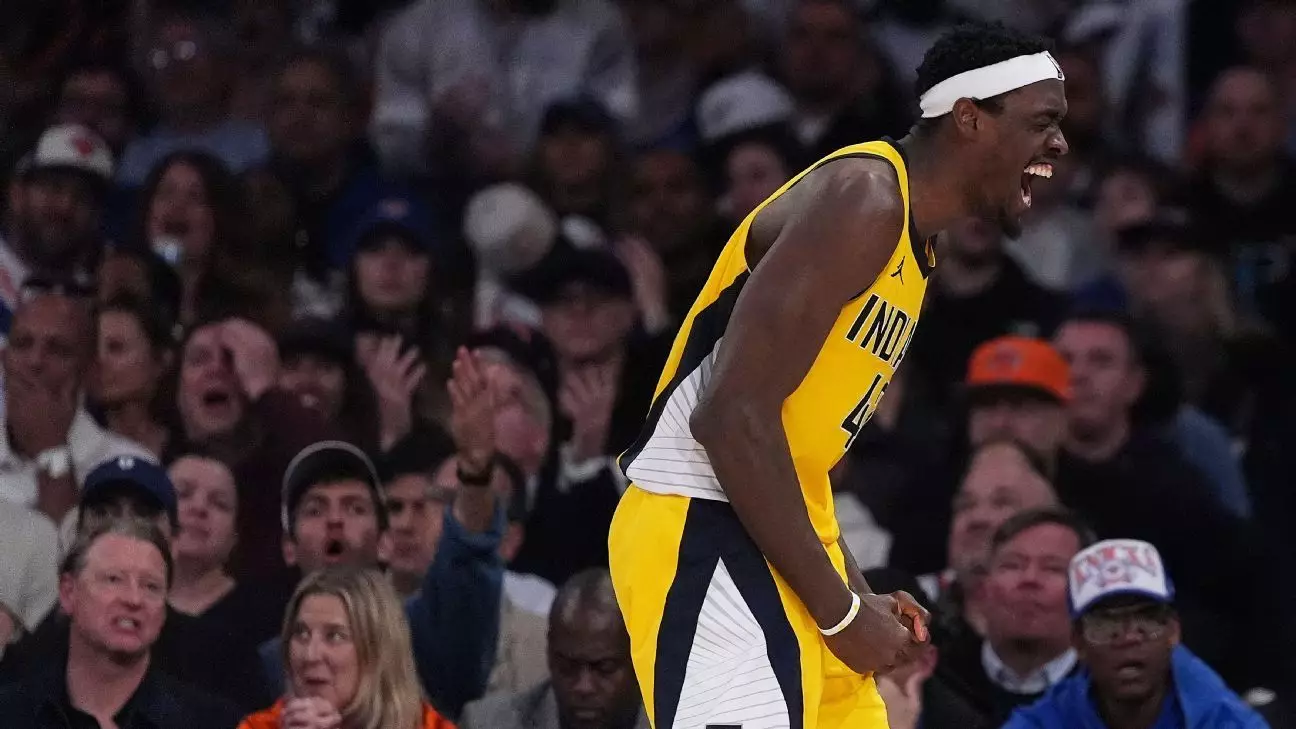In the poetic drama of the NBA’s postseason, every player must rise to the occasion, and rarely has a moment been as electrifying as Pascal Siakam’s resurgence during Game 2 of the Eastern Conference Finals. After a lackluster performance in the series opener, the Indiana Pacers understood that they could not rely solely on stumbles, and instead they needed their star forward to shine. The result? An astounding 39-point game that saw Siakam not just participating but effectively orchestrating the tempo of the matchup against the New York Knicks.
This wasn’t just a performance for the ages; it was a masterclass in overcoming adversity, spotlighting the transformative power of one player’s will. With 17 points in the first quarter, Siakam’s momentum buoyed the Pacers with a confidence that was palpable, silencing the infamous Madison Square Garden crowd and enforcing a 114-109 victory that shifted the series heavily in Indiana’s favor.
A Star’s Resilience and Resolve
While the performance itself is commendable, the narrative beyond the numbers is where the true richness lies. Siakam has not simply been cast as a scorer; he embodies resilience and poise on a grand stage. His remarks post-game echoed a wisdom accrued through victories and disappointments alike, emphasizing a singularity of purpose among the Pacers. “You can’t ride a wave,” he pointedly stated. These words encapsulate an essential foundation in professional sports: the ability to maintain focus amidst the white noise of highs and lows.
This isn’t mere sportsmanship; it’s a philosophy. Siakam has honed his leadership style, bringing not just talent but an ethos that binds teammates. His insights, drawn from a championship run with Toronto, lend a richness that transcends traditional coaching methods. Teammates look to Siakam not just for guidance, but for genuine camaraderie in the challenge they face together.
A Tactical Mastery
Rick Carlisle’s coaching strategy had to be flexible to accommodate for Siakam’s unique capabilities, and the coach’s recognition of Siakam’s prowess could not be more apt. The idea of a “quiet 39” is an interesting critique of conventional understanding about standout performances. Siakam’s points were not blaring; they were strategic, calculated, and delivered in moments that dampened opposition excitement—a fascinating dance of timing and precision.
In the playoffs, momentum can be as fickle as a gust of wind. Each point scored can swing the energy of a game, and Siakam’s uncanny ability to generate vital baskets at crucial junctures made him an agent of change. Carlisle’s praise for Siakam underscores a growing understanding in the league of how important playoffs are not just about talent but tactical execution, maintaining focus throughout the grueling nature of competitive play.
Honoring Past Rivalry
Siakam’s contentious matchup with former Raptors teammate OG Anunoby adds layers of intrigue to this series. The duality of competition between individuals who share history offers a fascinating narrative arc. Sport often thrives on these rivalries, making every point scored feel like a story of redemption or rivalry rekindled. Despite Anunoby holding Siakam at bay in Game 1, the tensions from their Toronto days became the fuel for Siakam’s fire.
In these dramatic playoff narratives, it’s easy to forget that human emotion often drives performance at these elite levels. Siakam crystalizes that notion: personal stakes become a rich backdrop against which heroic efforts unfold. The drive to outdo a friend-turned-foe contributes to his considerable arsenal, serving both as motivation and a psychological edge.
Balanced Brilliance and Team Dynamics
With six different players scoring in double figures, the Pacers displayed an underlying theme of unity and shared purpose. Tyrese Haliburton’s selflessness complements Siakam’s singular brilliance, affirming how individual talents can coalesce into a formidable collective force. Each player’s contributions provide the bedrock for stability, vital in the unpredictable arena of playoff basketball.
It’s this supporting cast that gives credence to the notion that championship teams are rarely built on the shoulders of a lone star. The blend of personalities and skill sets exemplifies the depth of the Pacers and their championship aspirations. Carlisle’s focus appears not only on winning games but also on cultivating a culture where each player feels accountable and valued, key ingredients for sustaining success.
As Game 3 looms ahead, psychological battles will be just as critical as tactical ones. The Pacers have established a foothold, but this journey is far from over—in fact, it has only just begun. With every dribble, pass, and shot, these players will weave their destinies, driven by past experiences and a desire for greatness that can only be achieved together.

